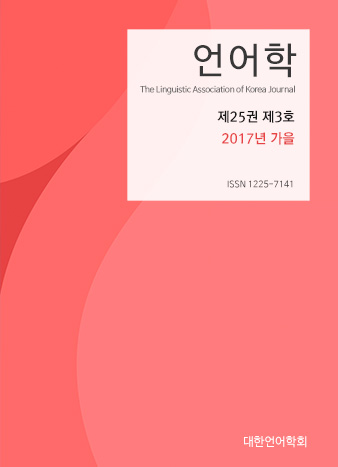대한언어학회 전자저널

25권 3호 (2017년 9월)
- 동화 기반·활동 기반 연어 지도가 초등학생의 연어 습득에 미치는 영향
-
박청아 & 홍선호
Pages : 133-151
Abstract
Park, Chunga & Hong, Sun-ho. (2017). The effects of story-based and activity-based collocation instruction on elementary students' collocation acquisition. The Linguistic Association of Korea Journal, 25(3). 133-151. The purpose of this study was to examine the effects of story-based and activity-based collocation instruction on collocation acquisition and affective domain of elementary fourth graders. The results of this study were as follows. Firstly, both experimental groups had significant improvement in collocation recognition and recall, but there was no significant differences between two groups. Secondly, experimental group 1 showed more positive effects on learning motivation, interest, confidence compared to experimental group 2. It is, therefore, necessary to enhance the awareness about the importance of collocation instruction and develop various collocation instruction methods and learning activities to acquire collocation more effectively.
주제어(Key Words): 연어(collocation), 재인(recognition), 회상(recall)
Keywords
# 연어(collocation) # 재인(recognition) # 회상(recall)
References
- 교육과학기술부. (2011). 초등학교 교육과정 해설(V). 서울: 교육과학기술부.
- 강정구. (1996). 현대학습심리학. 서울: 문음사.
- 김미영. (2011). 한국 영어 학습자의 연어 인식과 연어 사용 오류에 관한 연구. 새한영어영문학, 53(1), 151-173.
- 김민희. (2011). 연어를 활용한 스토리텔링 초등영어 수업의 효과. 석사학위논문. 광주교육대학교 교육대학원.
- 김성식. (2004). 초등학교 영어 교육을 위한 어휘 중심 교수법 수업 모형과 어휘 자료 개발에 관한 연구. 박사학위논문. 한국교원대학교 대학원.
- 김영미. (2001). 동화로 가르치는 초등영어. 서울: 문진미디어.
- 김혜연·김혜련. (2015). 어휘접근법 기반의 어휘지도가 초등영어 학습자의 어휘 활용 능력에 미치는 영향. 초등영어교육, 21(4), 115-139.
- 박성경. (2011). 초등 6학년 학습자들의 수용적·생산적 연어 지식 습득 분석. 석사학위논문. 서울교육대학교 교육대학원.
- 이재근·김민경. (2008). 어휘접근법을 활용한 어휘 지도가 초등학생 영어 의사소통능력에 미치는 영향. 영어교과교육, 7(2), 153-173.
- 이재근·정은숙. (2006). 초등학교 영어 학습자들의 정의적 영역 측정 도구 개발에 관한 연구. 영어교과교육, 5(2), 53-91.
- 이정은. (2010). 초등영어 수업에서 연어를 활용한 어휘학습지도의 효과. 석사학위논문. 공주교육대학교 교육대학원.
- 한미향. (2007). EFL 학습자의 연어 사용과 오류. 영어교육연구, 19(3), 245-264.
- 황소영. (2013). 연어 중심 어휘 지도가 초등학교 학습자의 듣기·말하기 능력 및 정의적 영역 향상에 미치는 영향. 석사학위논문. 서울교육대학교 교육대학원.
- Atkinson, R. C., & Shiffrin, R. M. (1968). Human Memory: A proposed system and its control processes. In K. W. Spence & J. T. Space (Eds.), The psychology of learning and motivation 2: Advanced in research and theory. New York: Academic Press.
- Benson, M., Benson, E., & Ilson, R. (1997). The BBI dictionary of English word combinations. Philadelphia, MA: John Benjamins.
- Coady. J., & Huckin, T. (1997). Second language vocabulary acquisition: A rationale for pedagogy. Cambridge: Cambridge University Press.
- Cook, V. (1994). Universal grammar and the learning and teaching of second language. In T. Odlin (Ed.), Perspectives on pedagogical grammar (pp. 25-48). Cambridge: Cambridge University Press.
- Ellis, G., & Brewster, J. (1991). The storytelling handbook for primary teachers. London: Penguin Books.
- Ellis, N. C. (2001). Memory for language. In P. Robinson (Ed.), Cognition and second language instruction (pp. 33-68). Cambridge: Cambridge University Press.
- Firth, J. R. (1957). Papers in Linguistics 1934-1951. London: Oxford University Press.
- Hill, J. (2000). Revising priorities: From grammatical failure to collocation success. In M. Lewis (Ed.), Teaching collocation: Further developments in the lexical approach (pp. 47-69). Hove, England: Language Teaching Publications.
- Koya, T. (2005). The acquisition of basic collocations by Japanese learners of English. Unpublished doctoral dissertation, Waseda University, Tokyo.
- Lewis, M. (1993). The lexical approach: The state of ELT and the way forward. Hove, England: Language Teaching Publications.
- Lewis, M. (1997). Implementing the lexical approach: Putting theory into practice. Hove, England: Language Teaching Publications.
- Lewis, M. (2000). Teaching collocation: Further developments in the lexical approach. Hove, England: Language Teaching Publications.
- McCarthy, M. (1990). Vocabulary. Oxford: Oxford University Press.
- Mitchell, T. F. (1975). Linguistic “going on”: Collocations and other lexical matters arising on the syntagmatic record. Archivum Linguisticum, 2, 35-69.
- Nattinger, J. (1988). Some current trends in vocabulary teaching. In R. Carter & M. McCarthy (Eds.), Vocabulary and language teaching (pp. 62-82). London: Longman.
- Nattinger, J. R., & Decarrico. J. S. (1992). Lexical phrases and language teaching. Oxford: Oxford University Press.
- Nation, I. S. P. (2001). Learning vocabulary in another language. Cambridge: Cambridge University Press.
- Nunan, D. (2000). Language teaching methodology. New York: Longman.
- Palmer, H. E. (1933). Second interim report on English collocation. Tokyo: Kaitakusha.
- Rivers, W. M. (1981). Teaching foreign-language skills. Chicago: The University of Chicago Press.
- Seal, B. D. (1991). Vocabulary learning and teaching. In M. Celce-Murcia (Ed.), Teaching English as a second or foreign language (pp. 296-311). Boston, MA: Heinle & Heinle.
- Sinclair, J. M. (1991). Corpus, concordance, collocation. Oxford: Oxford University Press.
- Singleton, D. (2000). Language and the lexicon: An introduction. New York: Oxford University Press.
- Twaddell, F. (1973). Vocabulary expansion in the TESL classroom. TESOL Quarterly, 10, 19-32.
- Wilkins, W. A. (1972). Linguistics and language teaching. London: Edward Arnold.
- Willis, D. (2003). Rules, patterns, and words. Cambridge: Cambridge University Press.
- Willis, J. (1996). A framework for task-based learning. Harlow, Essex: Longman.